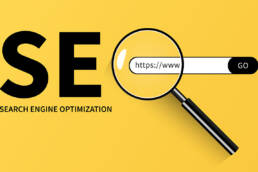In the ever-evolving digital landscape, where attention spans are fleeting and first impressions are critical, your website design serves as the gateway to your online presence. A well-crafted website is no longer a luxury but a necessity for businesses and individuals alike. It is the digital storefront that welcomes visitors, conveys your brand message, and influences user behavior.
The Anatomy of a Striking Website Design
Effective website design goes beyond aesthetics; it’s about creating an immersive experience that engages and converts visitors into loyal customers. Let’s delve into the key elements that make up a compelling website design:
- User-Centric Navigation
Intuitive navigation is the backbone of a user-friendly website. A well-thought-out menu structure and clear pathways ensure that visitors can effortlessly explore your content. Implementing features like breadcrumbs and a site map further enhances the user journey.
- Responsive and Mobile-Friendly
With the surge in mobile device usage, responsive design is non-negotiable. Your website should adapt seamlessly to various screen sizes, ensuring a consistent and enjoyable experience for users on smartphones, tablets, and desktops.
- Visually Captivating Layouts
Your website’s layout should strike a balance between form and function. Utilize whitespace, typography, and color schemes to create a visually appealing design that complements your brand identity. Highlight essential content with compelling imagery and graphics.
- Content That Tells a Story
Content is king, and a captivating narrative can set you apart. Use well-crafted copy to communicate your brand’s story, values, and offerings. Blogs, videos, and interactive elements can further engage your audience.
- Fast Loading Speeds
In today’s fast-paced world, nobody has time for slow-loading websites. Optimization techniques like image compression and efficient coding can significantly boost your website’s loading speed, enhancing user satisfaction and search engine rankings.
- Search Engine Optimization (SEO)
Effective website design integrates SEO strategies from the ground up. This includes optimizing meta tags, headings, and image alt text. A well-structured website with clear HTML markup also aids search engine crawlers in understanding your content.
- Interactive Elements
Engage your audience with interactive features like forms, surveys, and live chat. These elements not only enhance user experience but also provide valuable insights and opportunities for customer interaction.
The Impact of Website Design on Business Success
Your website is often the first point of contact between your brand and potential customers. Here’s how a well-designed website can positively impact your business:
- Enhanced Credibility
A polished and professional website design instills confidence in your visitors. It conveys trustworthiness and competence, which are crucial factors in decision-making.
- Improved User Experience
A user-friendly website keeps visitors engaged and encourages them to explore further. Positive user experiences lead to longer sessions, lower bounce rates, and increased conversions.
- Higher Conversion Rates
Effective website design guides users toward desired actions, whether it’s making a purchase, filling out a contact form, or subscribing to a newsletter. Thoughtful placement of call-to-action buttons and persuasive design elements can significantly boost conversion rates.
- Competitive Advantage
In a competitive online landscape, an exceptional website design sets you apart from the competition. It can be a key differentiator that draws customers to your brand.
- Mobile Accessibility
With the majority of internet traffic coming from mobile devices, a mobile-friendly website is essential for reaching a broader audience. Ignoring this aspect can lead to missed opportunities and lost revenue.
- Brand Consistency
Your website should reflect your brand’s identity seamlessly. Consistent branding, from your logo to your color scheme, reinforces brand recognition and trust.
The Evolution of Website Design
Website design is not a static field; it evolves continuously. Staying current with trends and innovations is vital to remain competitive. Some emerging trends in website design include:
- Minimalist Design
Less is more. Clean, minimalist designs with ample whitespace and a focus on essential elements are gaining popularity. This approach enhances readability and user engagement.
- Dark Mode
Dark mode design not only conserves energy but also offers a unique visual experience. It’s particularly appealing for websites focused on visual content, like photography and art portfolios.
- Microinteractions
Subtle animations and microinteractions can delight users and provide valuable feedback. They enhance user engagement and create a memorable experience.
- Voice User Interface (VUI)
With the rise of voice-activated devices, VUI is becoming more important. Designing for voice search and interaction is a new frontier in website design.
- Artificial Intelligence (AI)
AI-driven chatbots, personalized content recommendations, and dynamic user experiences are all part of the AI revolution in website design.
Conclusion: Elevate Your Digital Presence Through Website Design
In today’s digital age, your website is the face of your brand, and effective website design is the key to making a lasting impression. It’s not just about aesthetics; it’s about creating an experience that resonates with your audience and drives tangible results for your business.
Whether you’re building a new website or revamping an existing one, investing in professional website design is an investment in your brand’s success. It’s a commitment to providing users with a seamless and engaging experience, conveying your brand message effectively, and staying competitive in a rapidly evolving digital landscape.
Effective website design is a continuous journey of refinement and adaptation. It requires staying attuned to emerging trends, understanding user behavior, and aligning your design with your brand’s goals. Ultimately, it’s about leveraging the power of effective website design to revamp your digital presence and drive your brand forward in the digital age.




